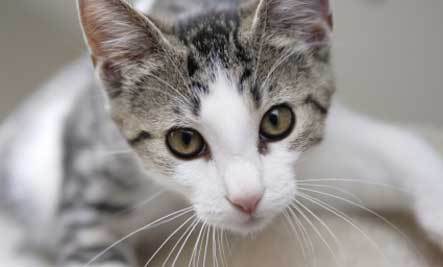Because cats are fastidious about their own cleanliness, they also want their litter boxes to be kept clean. Some cat owners do not empty the litter boxes often enough to suit their pets that do not want to do their business in the equivalent of an unflushed toilet. Can you blame them? Regularly changing the box to provide fresh litter at least once a day, more frequently if necessary and thoroughly washing the litter box weekly will ensure that your cat always has a clean place to go. Always have at least one more litter box than the number of cats. Even a single cat should have two boxes; that way if you are delayed getting home from work or are too tired to change the litter, the cat will still have a clean place to go.
Feline urine has an extremely pungent and unpleasant odour due to feline protein metabolism, a combination of uric acid, phosphates, calcium oxalates and aerates. If the cat has an inflammation or infection in his or her urinary tract, the protein concentration will be greater and will smell even worse. When dried, the urine forms crystals that create hard-to-remove stains.
Some specially formulated cleaning products are designed to target cat urine with enzymes that break down the crystals and remove the smell and the stains. Because cat urine is ammonia-based, using regular household cleaners — many of which contain ammonia — will not remove the stain or odour, and will in fact just encourage kitty to urinate in that same spot again. To the cat, the ammonia scent is reminiscent of his own urine! Thoroughly cleaning the affected area with the right products will get the stain and smell out, and the cat will not automatically return to that place to relieve himself or herself.
If the litter boxes are clean, but your cat still eliminates outside the box, he is showing his stress or displeasure. Your impulse may be to yell at him, but that would not accomplish anything except scaring and confusing him. If you catch him in the act of peeing on your carpet, instead of shouting at him, gently pick him up and confine him to a closed room with a clean litter box. He is eliminating on the carpet because something has scared him physically or emotionally, and once you have calmed down, you can start to figure out the reason.
Why Is Your Cat Not Using the Litter Box?
A cat suffering from a urinary tract infection finds urination painful, and may associate his litter box with this. Or he may need to urinate more often and starts peeing throughout the house. Kidney, liver and thyroid conditions leave cats thirsty, leading to more fluid intake and more frequent, urgent urination. Older cats with arthritis, muscular diseases or other age-related issues also may be unable to get to the litter box on time.
Declawed cats often develop an aversion to using a litter box because after surgery, their newly tender paws found scratching painful and they continue to link the litter box with that discomfort. Kitty litter manufactured from recycled newspapers offers declawed cats a more comfortable place to go, as does premium clumping (not clay) litter.
Changes in your household routine may affect your cat’s litter box behaviour. Moving to a new home or even schedule changes is a major change for your cat. A new baby or another animal companion, a kid leaving for college, even the your leaving the household for a holiday can all impact a cat, and he may react by urinating outside his box.
Further, a cat always notices if you have switched the type or brand of litter he has been accustomed to using. The scent of a different litter or its feel on his paws may not be to his liking, and he will stop using the box. Other cats dislike covered litter boxes or litter liners. If you have decided to incorporate these, be sure the cat has access to his old-style box as well. A new location for a litter box can initially stress your cat, so if the box is in a new spot, keep another in the previous location until the cat adapts.
Adapted from an article by Kathy Blumenstock on Animal Planet




